-
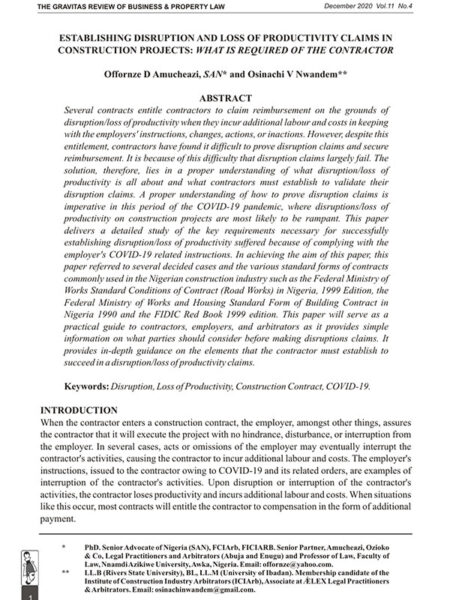
Establishing Disruption and Loss of Productivity Claims in Construction Projects: What is Required of the Contractor
0₦2,500.00Professor Offornze Amucheazi, SAN of the Nnamdi Azikiwe University Awka Nigeria and Osinachi Nwandem, Associate at ǼLEX in their article, Establishing Disruption and Loss of Productivity Claims in Construction Projects: What is Required of the Contractor, note that while contracts may entitle contractors to claim reimbursement on the grounds of disruption/loss of productivity when they incur additional costs, contractors have always found it challenging to prove disruption claims and secure reimbursement. The solution lies in a proper understanding of what disruption/loss of productivity is and what contractors must establish to validate their disruption claims. Professor Amucheazi and Nwandem analyse how to prove disruption claims against the background of COVID-19 pandemic. They review several decided cases and the various standard forms of contracts commonly used in the Nigerian construction industry including the FIDIC Red Book, the Federal Ministry of Works Standard Conditions of Contract (Road Works) in Nigeria, and the Federal Ministry of Works and Housing Standard Form of Building Contract in Nigeria, to come up with a practical guide to contractors, employers, and arbitrators.
-
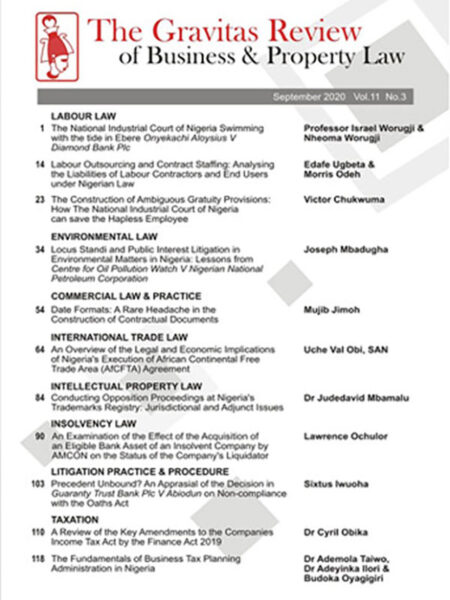
The Gravitas Review of Business & Property Law Vol.11 No.3 – Print
0₦5,000.00In this issue of The Gravitas Review of Business & Property Law Vol.11 No.3, there are well researched articles on:
- Labour Law
- Environmental Law
- Commercial Law & Practice
- International Trade Law
- Intellectual Property Law
- Insolvency Law
- Litigation Practice & Procedure
- Taxation
-

The Gravitas Review of Business & Property Law Vol.11 No.3 – E-Book
0₦5,000.00In this issue of The Gravitas Review of Business & Property Law Vol.11 No.3, there are well researched articles on:
- Labour Law
- Environmental Law
- Commercial Law & Practice
- International Trade Law
- Intellectual Property Law
- Insolvency Law
- Litigation Practice & Procedure
- Taxation
-

The Gravitas Review of Business & Property Law Vol.11 No.3
0₦5,000.00In this issue of The Gravitas Review of Business & Property Law Vol.11 No.3, there are well researched articles on:
- Labour Law
- Environmental Law
- Commercial Law & Practice
- International Trade Law
- Intellectual Property Law
- Insolvency Law
- Litigation Practice & Procedure
- Taxation
-
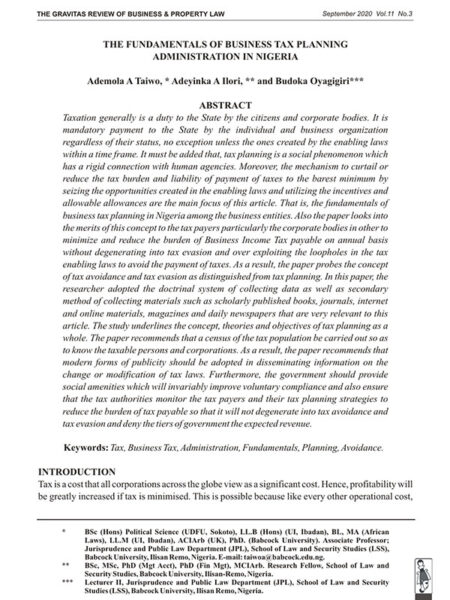
The Fundamentals of Business Tax Planning Administration in Nigeria
0₦2,500.00Dr Ademola Taiwo, Dr Adeyinka Ilori, and Budoka Oyagigiri all of Babcock University Ilisan Remo Nigeria, in their article,The Fundamentals of Business Tax Planning Administration in Nigeria, posit that the mechanisms to curtail or reduce a taxpayer’s burden to the barest minimum by seizing the opportunities created in tax laws and utilizing the incentives and allowances are the main focus of tax planning. Dr Ademola Taiwo et al examine the concepts of tax avoidance, tax evasion and tax planning for business entities. They consider the theories of tax planning and management, the essence of tax management, and forms and incidents of tax planning in the Nigerian tax administration.
-
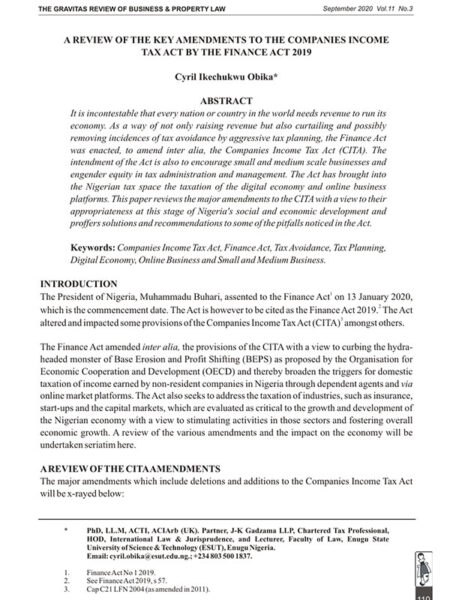
A Review of the Key Amendments to the Companies Income Tax Act by The Finance Act 2019
0₦2,500.00Dr Cyril Obika, Partner J-K Gadzama LLP and Lecturer, Faculty of Law, Enugu State University of Science and Technology (ESUT) Agbani Nigeria, in his article, A Review of the Key Amendments to the Companies Income Tax Act by The Finance Act 2019 examines significant changes to the CITA by the Finance Act including the taxation of the digital economy and online business platforms, formal introduction of the Thin Capitalisation Rule, the removal of total tax exemption on interest, and changes to the Excess Dividend Tax Rule.
-
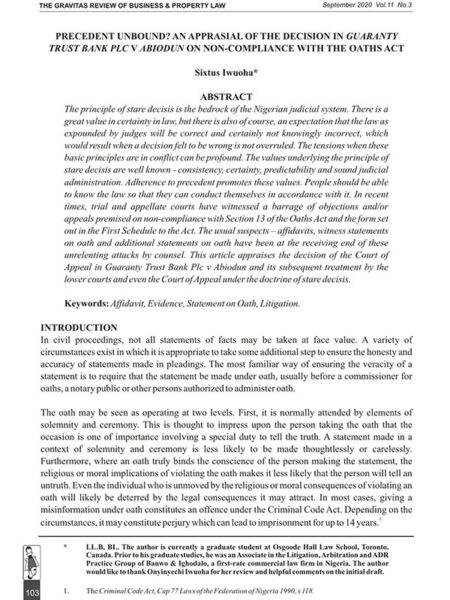
Precedent Unbound? An Appraisal of the Decision in Guaranty Trust Bank Plc V. Abiodun on Non-Compliance with the Oaths Act
0₦2,500.00Sixtus Iwuoha, formerly of Banwo & Ighodalo and now a graduate student at Osgoode Hall Law School Toronto Canada, in his article, Precedent Unbound? An Appraisal of the Decision in Guaranty Trust Bank Plc V. Abiodun on Non-Compliance with the Oaths Act, observes that in recent times, trial and appellate courts have witnessed a barrage of objections and appeals premised on non-compliance with Section 13 of the Oaths Act and the form set out in the First Schedule to the Act. The usual suspects – affidavits, witness statements on oath and additional statements on oath have been at the receiving end of these unrelenting attacks by counsel. Sixtus appraises the decision of the Court of Appeal in Guaranty Trust Bank Plc V. Abiodun and the subsequent treatment accorded to same by the lower courts and even the Court of Appeal under the doctrine of stare decisis.
-
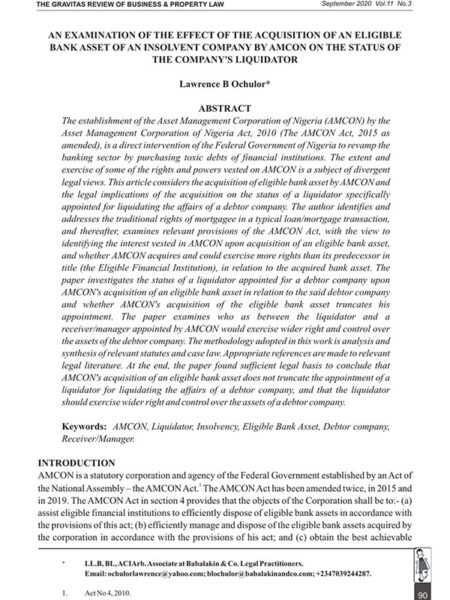
An Examination of the Effect of the Acquisition of An Eligible Bank Asset of an Insolvent Company by AMCON on the Status of the Company’s Liquidator
0₦2,500.00Lawrence Ochulor, Associate at Babalakin & Co. Lagos Nigeria, in his article, An Examination of the Effect of the Acquisition of An Eligible Bank Asset of an Insolvent Company by AMCON on the Status of the Company’s Liquidator, considers the acquisition of an eligible bank asset by AMCON and the legal implications of the acquisition on the status of a liquidator specifically appointed for liquidating the affairs of a debtor company. Lawrence interrogates the traditional rights of a mortgagee in a typical loan/mortgage transaction, the interest vested in AMCON on the acquisition of an eligible bank asset, whether AMCON acquires and could exercise more rights than its predecessor in title concerning the acquired bank asset, the status of a liquidator appointed for a debtor company, and whether AMCON’s acquisition of the eligible bank asset truncates the liquidator’s appointment
-
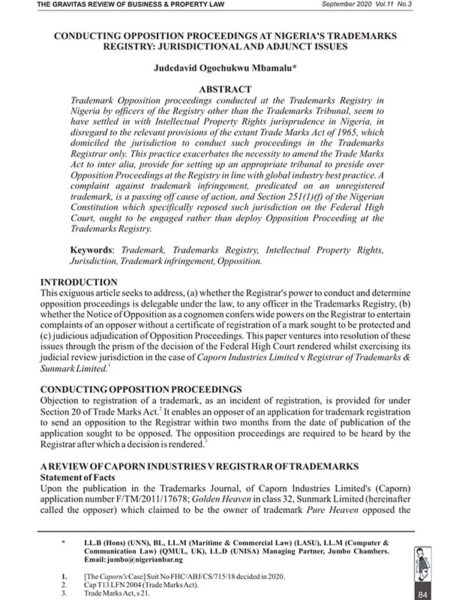
Conducting Opposition Proceedings at Nigeria’s Trademark Registry: Jurisdictional and Adjunct Issues
0₦2,500.00Dr Judedavid Mbamalu, Managing Partner Jumbo Chambers, in his article, Conducting Opposition Proceedings at Nigeria’s Trademark Registry: Jurisdictional and Adjunct Issues, posits that Trademark Opposition proceedings conducted at the Trademarks Registry in Nigeria by officers of the Registry other than the Registrar, seem to be the norm in disregard of the relevant provisions of the Trade Marks Act 1965 which reposes the jurisdiction to conduct such proceedings in the Trademarks Registrar only. Dr Mbamalu reviews the decision of the Federal High Court in Caporn Industries Limited V. Registrar of Trademarks and concludes that a complaint against trademark infringement, predicated on an unregistered trademark, ought to be ventilated at the Federal High Court rather than using Opposition proceedings at the Trademarks Registry as a short cut to pursue such claims.
-
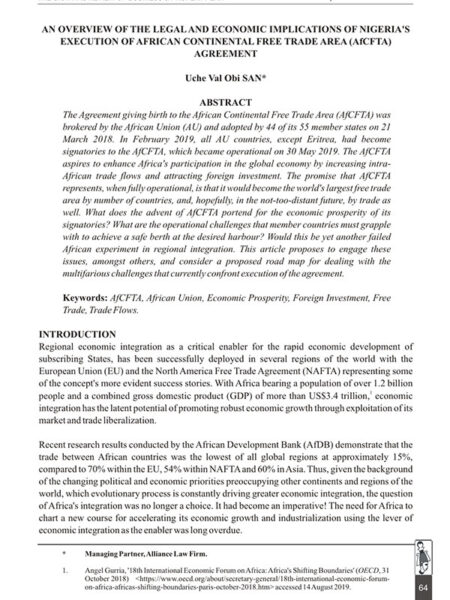
An Overview of the Legal and Economic Implications of Nigeria’s Execution of the African Continental Free Trade Area (AfCFTA) Agreement
0₦2,500.00Uche Val Obi SAN of Alliance Law Firm Lagos Nigeria, in his article, An Overview of the Legal and Economic Implications of Ngeria’s Execution of the African Continental Free Trade Area (AfCFTA) Agreement comprehensively reviews the AfCFTA Agreement brokered by the African Union and adopted by 44 of its 55 member states on 21 March 2018. The AfCFTA aspires to enhance Africa’s participation in the global economy by increasing intra-African trade flows and attracting foreign investment. The promise that AfCFTA represents, when fully operational, is that it would become the world’s largest free trade area by the number of countries, and in the not-too-distant future, by trade as well. Val Obi SAN examines what AfCFTA portends for the economic prosperity of its signatories and the operational challenges that member countries must grapple with to achieve a safe berth at the desired harbour. He proposes a road map for dealing with the multifarious challenges that currently confront the agreement.
-
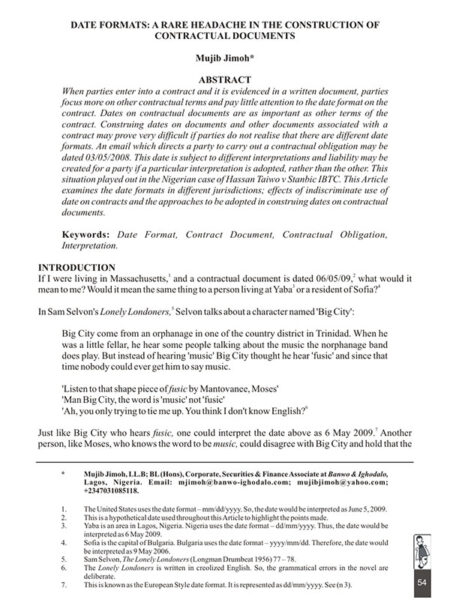
Date Format: A Rare Headache in the Construction of Contractual Documents
0₦2,500.00Mujib Jimoh, Associate at Banwo & Ighodalo Lagos Nigeria, in his article, Date Format: A Rare Headache in the Construction of Contractual Documents, observes that when parties enter into a contract, and it is evidenced in a written document, they usually focus more on other contractual terms and pay little attention to the date format on the contract. Construing dates on documents may prove very difficult if parties do not realise that there are different date formats. An email which directs a party to carry out a contractual obligation may be dated 03/05/2008. This date is subject to different interpretations and liability may be created for a party if a particular interpretation is adopted, rather than the other. This situation played out in the Nigerian case of Hassan Taiwo V. Stanbic IBTC. Mujib examines the date formats in different jurisdictions, the effects of indiscriminate use of date on contracts, and the approaches to be adopted in construing dates on contractual documents.
-
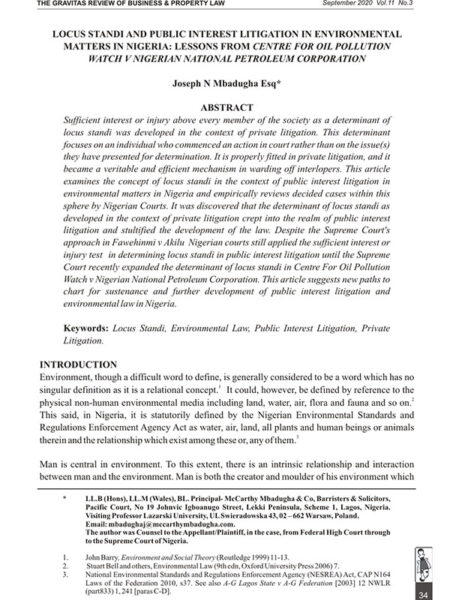
Locus Standi and Public Interest Litigation in Environmental Matters in Nigeria: Lessons from Centre for Oil Pollution Watch V Nigerian National Petroleum Corporation
0₦2,500.00Joseph Mbadugha of McCarthy Mbadugha & Co Lagos Nigeria, Visiting Professor of Lazarski University Warsaw, Poland and the Counsel to the Appellant/Plaintiff from the Federal High Court through to the Supreme Court of Nigeria in the case of Centre for Oil Pollution Watch V. Nigerian National Petroleum Corporation takes a second look at the landmark case. In his article, Locus Standi and Public Interest Litigation in Environmental Matters in Nigeria: Lessons from Centre for Oil Pollution Watch V. Nigerian National Petroleum Corporation, Mbadugha notes that ‘sufficient interest’ or ‘injury above other members of the society’, a determinant of locus standi developed in private litigation to ward off meddlesome interlopers, crept into the realm of public interest litigation with the resultant stultifying effect until the Supreme Court expanded the coast in COPW V. NNPC. He reviews decided cases in the evolution of locus standi in public interest litigation and suggests new paths for sustenance and development of public interest litigation and environmental law in Nigeria.
The Gravitas Review of Business & Property Law



